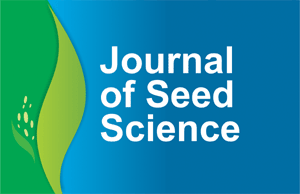Biosaline agriculture has been a viable alternative for agricultural production in regions with lack of good quality water. To enable the cultivation of vegetables in high electrical conductivities, seed priming has been used to increase tolerance to stress caused by use of brackish water. We aimed to evaluate the efficiency of osmo and hydropriming in cucumber seeds cv. Caipira germinated biosaline in water, regarding germination and biochemical changes during the germinative process. The experimental design was totally randomized, with four replications of 50 seeds or 10 seedlings, in a factorial scheme 6x3; with six priming conditions (control, osmopriming during 24 and 48 hours, hydropriming with 1, 2 and 3 cycles of hydration-dehydration) and three biosaline water (fish farming biosaline wastewater) concentrations in distilled water (0, 50 e 100%). We evaluated the kinetics and percentage of germination; germinative metabolism and activity of antioxidant enzymes. According to the results, one hydropriming cycle is faster and more efficient to improve the performance of cucumber seedling in biosaline water and this can be used in substrate for germinating seeds of cucumber cv. Caipira.
water reuse; Curcubitaceae; seedling development







